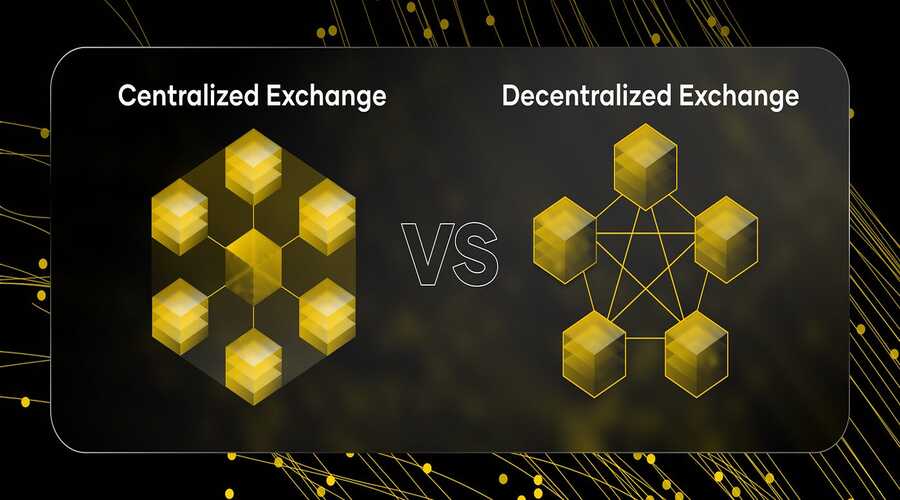In recent years, the cryptocurrency market has witnessed a significant surge in popularity, leading to the emergence of various cryptocurrency exchanges. With the increase in demand, two primary types of exchanges have gained traction: centralized exchanges (CEX) and decentralized exchanges (DEX). In this article, we will explore the key differences between CEX and DEX, the pros and cons of each type, and which one might be a better fit for you.
Introduction to CEX and DEX
Centralized exchanges, or CEXs, are owned and operated by a centralized organization. These exchanges function like traditional stock exchanges, where buyers and sellers come together on a single platform to trade cryptocurrencies. The centralized nature of these exchanges means that they are subject to government regulations and are required to follow strict KYC (Know Your Customer) and AML (Anti-Money Laundering) procedures.
On the other hand, decentralized exchanges, or DEXs can operate on a peer-to-peer (P2P) network without the requirement of a centralized authority. DEXs are built on top of blockchain technology, allowing users to trade cryptocurrencies directly with each other without the need for an intermediary. Since DEXs are not controlled by a single entity, they are generally considered more transparent and secure.
Security
One of the main concerns when it comes to cryptocurrency exchanges is security. While both CEXs and DEXs have their own security measures in place, they are vulnerable to different types of attacks. CEXs are particularly susceptible to hacks, as they store large amounts of cryptocurrencies in hot wallets that are connected to the internet. On the other hand, DEXs are less vulnerable to hacks since they don’t store user funds, but they can still be targeted by other types of attacks, such as phishing scams.
To mitigate security risks, it’s important to choose an exchange with a strong track record of security and to take additional measures such as enabling two-factor authentication and storing your cryptocurrencies in a secure hardware wallet.
Regulations
Centralized exchanges are subject to government regulations and must comply with KYC and AML procedures. This means that users must provide personal information such as their name and address in order to trade cryptocurrencies. Some governments have also imposed additional regulations on cryptocurrency exchanges, such as licensing requirements and tax obligations.
Decentralized exchanges, on the other hand, operate on a peer-to-peer network without the need for a centralized authority. This makes them resistant to government regulations, but it also means that users may be more susceptible to fraud and scams.
Liquidity
The ability to buy or sell a cryptocurrency quickly and at a reasonable price is called liquidity. CEXs usually have more liquidity than DEXs, which means that there are more buyers and sellers on the platform. This makes it easier to buy or sell cryptocurrencies quickly and at a fair price.
However, liquidity can vary between different cryptocurrencies and exchanges. Some cryptocurrencies may have higher liquidity on DEXs, while others may have higher liquidity on CEXs.
User Interface
The user interface of an exchange has a significant impact on the user experience. CEXs are generally more user-friendly than DEXs, with intuitive interfaces that are easy to navigate. This makes them more accessible to novice traders who may be intimidated by the complexity of DEXs.
DEXs, on the other hand, are often more difficult to use due to their decentralized nature. Users must have a basic understanding of blockchain technology and be comfortable using cryptocurrency wallets in order to use a DEX.
Fees
Transaction fees can vary significantly between different exchanges and cryptocurrencies. In general, CEXs tend to have lower transaction fees than DEXs. However, this can vary depending on the exchange and the specific cryptocurrency being traded.
It’s important to consider transaction fees when choosing an exchange, as they can significantly impact your profitability as a trader. Some exchanges may also charge additional fees for withdrawals, deposits, and other services, so it’s important to read the fine print before choosing an exchan
Pros and Cons of CEX and DEX
Pros of CEX
- High liquidity: Centralized exchanges have high trading volumes, making it easier for traders to buy and sell cryptocurrencies.
- User-friendly interface: CEXs are generally more user-friendly than DEXs, making them more accessible to novice traders.
- Lower fees: Centralized exchanges often charge lower transaction fees than decentralized exchanges.
Cons of CEX
- Centralized control: Since CEXs are owned and operated by a centralized entity, they are subject to government regulations and can be shut down or hacked.
- Security risks: Centralized exchanges are a prime target for hackers due to the large amounts of cryptocurrencies stored in their wallets.
- Lack of transparency: Since centralized exchanges are owned by a single entity, there is a lack of transparency in their operations.
Pros of DEX
- Decentralized control: DEXs operate on a decentralized network, making them resistant to government regulations and control.
- Increased security: Since DEXs do not store user funds, they are less susceptible to hacking attacks.
- Transparency: DEXs are more transparent than centralized exchanges, as their transactions are recorded on a public blockchain.
Cons of DEX
- Low liquidity: Decentralized exchanges generally have lower trading volumes, leading to less liquidity.
- Complex user interface: DEXs are often more difficult to use than CEXs, making them less accessible to novice traders.
- Higher fees: Decentralized exchanges often charge higher transaction fees than centralized exchanges.
Which one is right for you?
Deciding whether to use a CEX or DEX ultimately depends on your personal preference and trading style. If you value ease of use, high liquidity, and low fees, a centralized exchange might be the better option. However, if you prioritize transparency, security, and decentralized control, a decentralized exchange might be a better fit for you.
Conclusion
In conclusion, centralized exchanges and decentralized exchanges each have their own advantages and disadvantages. While CEXs offer high liquidity and user-friendly interfaces, they are also subject to government regulations and security risks. DEXs, on the other hand, are more secure and transparent but may be more challenging to use and have lower liquidity. Ultimately, the choice between CEX and DEX depends on your trading style and priorities.





